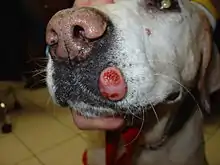Veterinary oncology
Veterinary oncology is a subspecialty of veterinary medicine that deals with cancer diagnosis and treatment in animals. Cancer is a major cause of death in pet animals. In one study, 45% of the dogs that reached 10 years of age or older died of cancer.[1]

Skin tumors are the most frequently diagnosed type of tumor in domestic animals for two reasons: 1. constant exposure of animal skin to the sun and external environment, 2. skin tumors are easy to see because they are on the outside of the animal.[2]
Cancer statistics
Male dogs
| Type of Cancer | % of Total Cancer |
|---|---|
| Connective Tissue | 17 |
| Testis | 16 |
| Skin (Melanoma) | 14 |
| Mouth and Throat | 10 |
| Lymphoma | 10 |
| Bone | 4 |
| Stomach and Intestines | 3 |
| Nasal cavity | 1-2 |
Human-animal cancer connections
Companion animals such as dogs and cats suffer from many of the same types of cancer as humans. Cancer research with dogs has helped in the design of clinical trials for cancer therapy for humans. In the spirit of the One Health movement (global collaborative research on human and animal health) such human-animal connections in cancer research could benefit both humans and animals with cancer in the future.[1][6]
Animals with cancer also sometimes function as animal sentinels that provide an early warning of carcinogens and an environmental health hazard to humans.[7][8]
Ethical issues
Veterinarians use the HHHHHMM Scale to discuss animal quality of life with pet owners before a euthanasia decision is made for a pet with an incurable disease such as cancer (the letters stand for Hurt Hunger Hydration Hygiene Happiness Mobility and "More good days than bad days").[9][10]
References
- Withrow, Stephen J. (2007). "Why worry about cancer in pets?". In Withrow, Stephen J.; MacEwen, E. Gregory (eds.). Small Animal Clinical Oncology (4th ed.). Philadelphia: W.B. Saunders. pp. xv–xvii. ISBN 978-0-7216-0558-6.
- Tumors of the Skin and Soft Tissues: Introduction, The Merck Veterinary Manual http://www.merckvetmanual.com/mvm/index.jsp?cfile=htm/bc/72200.htm&word=neoplasm
- Veterinary Medicine @ About - information about pets, diseases, vet schools
- Cancer in Dogs Archived September 2, 2007, at the Wayback Machine
- Kelsey, J. L.; Moore, A. S.; Glickman, T. (1998). "Epidemiologic Studies of Risk Factors for Cancer in Pet Dogs". Epidemiologic Reviews. 20 (2): 204–17. doi:10.1093/oxfordjournals.epirev.a017981. PMID 9919439.
- Thamm, D; Dow, S (2009). "How companion animals contribute to the fight against cancer in humans" (PDF). Veterinaria Italiana. 45 (1): 111–20. PMID 20391394.
- Rabinowitz, P; Scotch, M; Conti, L (2009). "Human and animal sentinels for shared health risks". Veterinaria Italiana. 45 (1): 23–4. PMC 2818012. PMID 20148187.
- Withrow, Stephen J., and MacEwen, E. Gregory, eds. Small Animal Clinical Oncology. 4th ed. Philadelphia, PA: W.B. Saunders, c2007, pp. 12–15.
- The Merck/Merial Manual For Pet Health: The complete health resource for your dog, cat, horse or other pets – in everyday language, eds. Cynthia M. Kahn, Scott Line, Merck & Co., Inc., 2007, ISBN 0-911910-99-9, ISBN 978-0-911910-99-5, p. 1250.
- Villalobos, A.E., Quality of Life Scale Helps Make Final Call, Veterinary Practice News, September 2004 in Canine and Feline Geriatric Oncology Honoring the Human-Animal Bond, Blackwell Publishing, Table 10.1, 2006 Adaption: http://www.veterinarypracticenews.com/vet-practice-news-columns/bond-beyond/quality-of-life-scale.aspx
See also
- Skin cancer in cats and dogs
- Bladder cancer in cats and dogs
- Bone cancer in cats and dogs
- Intestinal cancer in cats and dogs
- Nose cancer in cats and dogs
- Stomach cancer in cats and dogs
- Soft tissue sarcoma in cats and dogs
- Lymphoma in animals
- Feline leukemia
- List of cancers in dogs
- Oncology
- Veterinary Medicine
- Cancer in dogs
- Cancer in cats